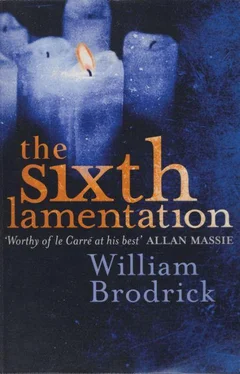William Brodrick - The Sixth Lamentation
Здесь есть возможность читать онлайн «William Brodrick - The Sixth Lamentation» весь текст электронной книги совершенно бесплатно (целиком полную версию без сокращений). В некоторых случаях можно слушать аудио, скачать через торрент в формате fb2 и присутствует краткое содержание. Жанр: Триллер, на английском языке. Описание произведения, (предисловие) а так же отзывы посетителей доступны на портале библиотеки ЛибКат.
- Название:The Sixth Lamentation
- Автор:
- Жанр:
- Год:неизвестен
- ISBN:нет данных
- Рейтинг книги:5 / 5. Голосов: 1
-
Избранное:Добавить в избранное
- Отзывы:
-
Ваша оценка:
- 100
- 1
- 2
- 3
- 4
- 5
The Sixth Lamentation: краткое содержание, описание и аннотация
Предлагаем к чтению аннотацию, описание, краткое содержание или предисловие (зависит от того, что написал сам автор книги «The Sixth Lamentation»). Если вы не нашли необходимую информацию о книге — напишите в комментариях, мы постараемся отыскать её.
The Sixth Lamentation — читать онлайн бесплатно полную книгу (весь текст) целиком
Ниже представлен текст книги, разбитый по страницам. Система сохранения места последней прочитанной страницы, позволяет с удобством читать онлайн бесплатно книгу «The Sixth Lamentation», без необходимости каждый раз заново искать на чём Вы остановились. Поставьте закладку, и сможете в любой момент перейти на страницу, на которой закончили чтение.
Интервал:
Закладка:
And so, on the day Lucy listened to the considered views of Doctor Pierre Vallon, the two men left Larkwood first thing after Lauds. With Conroy at the wheel they sped north, the skies getting wider and brighter, the horizon flatter and longer. Anselm’s mind opened like a plain and he saw scattered here and there, like totems, the outline of those who had recently crossed his path; and Conroy sang wonderfully mournful songs to himself about a betrayed woman and her abandoned child, a young father on a British prison ship and a ditty on violent child abuse. You had to cry; you had to laugh.
Anselm turned his mind to the conversation with Father Chambray the night before, noting bitterly how apposite it was that the truth should finally have made its way out in a confessional. Father Pleyon, a monk of Les Moineaux, had betrayed The Round Table. Unforeseen executions had followed. And by an inexplicable, almost comic quirk of circumstance, Father Pleyon had become the new Prior. Why was it, thought Anselm, that chance so often assisted the wicked? Schwermann and Brionne had been handed a lifeline just when they might have been brought to justice: their accomplice had become the Prior and had lived long enough to secure their escape.
But Father Chambray had pieced together some fragments. He had read the signs. He had told Rome and they had done nothing. And, in dismay, he had left his Priory and his church, a priest for ever in a wilderness without sacraments.
‘Con,’ said Anselm, ‘would you mind not singing for a moment?’
‘All right, so.’
‘Tell me again what Sticky Fingers told you.’ Anselm had already been told, but he wanted to place the little Conroy had found out in context now that he had spoken to Chambray
Conroy pursed his lips, thinking. ‘The Vatican Secret Archive holds two reports from Les Moineaux, and both had been withdrawn by your man Renaldi in early April 1995.’
‘Just after Schwermann was exposed.’
‘Aye. The first was written by Chambray shortly after the end of the war.
Anselm knew what it contained, and he would soon see a copy
‘The second was written a year or so afterwards by Pleyon, just before the Lord called him to Himself. It was sent on to Rome by the new Prior with a note saying the old skin didn’t get a chance to finish whatever he wanted to say
Anselm, like Father Chambray, could now read the signs that had fallen into his hands. He placed himself before an earnest, sincere Monsignor quietly watched by an attentive Cardinal, each knowing the whole narrative set out by Chambray But they had only disclosed the incomplete report of Pleyon, knowing it was the beginnings of a self-preserving fiction. ‘I’m trying to protect the future from the past,’ the Cardinal had said.
Conroy returned to his singing and Anselm slept. They lunched and then pressed on, saying little. As late afternoon cloud gathered over the rolling Cheviot Hills, Conroy pointed to the signpost directing them to Victor Brionne’s hideaway After a few miles of empty, windswept road they reached a display board, informing the unwary that Lindisfarne was a tidal island. They were just in time to cross the narrow causeway before the cold, slate-blue sea crept over the sands and cut them off from the mainland. By the time they had found their bed and breakfast, booked by Wilf the night before, no one could reach or leave the island.
When night fell, Anselm left his companion in the bar and wandered outside, over to a cluster of solid monastic ruins, a fortress carved out of the sky. Standing alone with the wind in his face, he joined himself to the Celtic monks who had once gathered beneath brooding arches by a sea that ran to the ends of the earth; he said the psalms of Compline, as they had once done, while the sharp night enclosed him. Then he walked along a rocky shore towards a large house with its windows lit, the curtains left open. A wooden plaque on a gatepost bore the name ‘Pilgrim’s Rest’. Anselm leaned on the adjoining wall, concealed by darkness, looking in upon a play of domestic contentment.
Robert Brownlow sat at a piano. Adults and children, seemingly endless in number, passed to and fro across the glass as if on a stage, each with a walk-on part. Most were laughing, cans or cups in their hands, little boys and girls with beakers spiked with straws, and no one seemed to notice the old man seated by the window, looking out into the night as if he were alone.
That must be Victor Brionne, thought Anselm, and none of his family realise he carries a secret, except perhaps Robert. All available generations had gathered for a bash, untouched by the trial in London that had never been more than words in a news-. paper, remote but disturbing if read, destined to be thrown out with the cold leftovers within a day or so. Anselm suffered a stab of grief on their behalf, Was it really necessary to pull down what had been built over fifty years? Should the little boy with the beaker have to lose the grandfather he thought he had? Or go to school and hear whisperings or taunts? But then Agnes Embleton was approaching death, unknown to the judicial process, a forgotten victim. Lucy had once been a child with a beaker spiked by a straw but she had not been spared by ignorance. The vindication of one family entailed the destruction of another.
Anselm turned away heavily, wishing dearly that he did not have a part of his own to play: the awful role of the minor character who brings the news he does not understand, whose brief speech shatters unsuspecting lives, and who then walks off for a smoke in the dressing room. That would be Anselm’s contribution to the Brownlow family history.
Brownlow Again Anselm strained to recover a stirring at the back of his mind evoking a pleasant sensation. It was a name he’d known as a boy
2
Max Nightingale’s studio was a single room above a pet shop in Tooting. He said he lived elsewhere but a camp bed stood folded in the corner next to a small fridge, a Primus, a wobbly clothing rail and other innumerable signs of sustained habitation. Leaning against each wall were canvases stacked three or four deep. The walls themselves were covered with work in progress. Light swam among the colour. It was extraordinarily peaceful.
Max was self-conscious but seemed pleased to bring Lucy and Mr Lachaise into his private place. He glanced easily at the walls as if they represented a quiet gathering of his silent family, not one of whom had the capacity to cause acute embarrassment.
Mr Lachaise walked slowly past each canvas, his glasses off, his face peering at the fluid marks of the brush, once wet, now caught glistening in time. He took several steps back, replacing his glasses. ‘Quite wonderful,’ he said, almost to himself.
Max had withdrawn to one end where an easel was angled against the light, beside a table with jars and saucers huddled by a battered box. He kept away from Lucy, though not obviously, rearranging brushes and tubes of paint. Turning round she saw a painting hung upon the back of the door.
The picture described the hint of a face, perhaps an open mouth crying out, amongst swathes of gorgeous yellow and orange, breaking down in places to smatterings of diaphanous brown and gold, lifted up, as it were, like tiny hands. It was more a study in colour than shape, but the coincidence of lines suggested such a fragile purpose that the viewer was compelled to impose a reading upon it. Lucy understood its mood and wanted to run her fingers along the frail ridges of paint.
She said, ‘Does it have a title?’
“‘Sibyl’s Cave”.’
Lucy surveyed the vibrant, tragic beauty, unable to detach herself from its activity.
‘Would you like it?’ asked Max.
In her taut mind she clutched at a refusal, but she wanted it. Lucy nodded quickly, keeping her eyes on what she had seen.
Читать дальшеИнтервал:
Закладка:
Похожие книги на «The Sixth Lamentation»
Представляем Вашему вниманию похожие книги на «The Sixth Lamentation» списком для выбора. Мы отобрали схожую по названию и смыслу литературу в надежде предоставить читателям больше вариантов отыскать новые, интересные, ещё непрочитанные произведения.
Обсуждение, отзывы о книге «The Sixth Lamentation» и просто собственные мнения читателей. Оставьте ваши комментарии, напишите, что Вы думаете о произведении, его смысле или главных героях. Укажите что конкретно понравилось, а что нет, и почему Вы так считаете.












